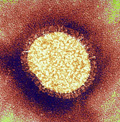 The European Centre for Disease Prevention and Control (ECDC) says it is not too late to take preventative measures to help minimise the impact of the flu outbreak, noting that monitoring this year’s influenza season is particularly important as it is the first since the H1N1 pandemic.
The European Centre for Disease Prevention and Control (ECDC) says it is not too late to take preventative measures to help minimise the impact of the flu outbreak, noting that monitoring this year’s influenza season is particularly important as it is the first since the H1N1 pandemic.
Reports from the UK, which has been hit particularly hard by flu this year, suggest a steady fall in deaths and in the numbers presenting to doctors.
GPs say the number of new flu cases now stands at around one third of the figure seen over the Christmas period. Flu consultations stood at 41 per 100,000 people last week compared to 66 per 100,000 the week before.
In addition, the Health Protection Agency in the UK says that H1N1 is no longer the dominant strain of flu in circulation. Of the three most common types of influenza virus, strain B is now the most prevalent. However, H1N1 is still the dominant strain among people whose deaths are attributed to flu.
The fall-off in new cases is seen as welcome news but the authorities have been quick to urge vigilance. The number of cases is still higher than expected during a normal winter flu season.
Professor Dame Sally Davies, the UK’s interim chief medical officer, said: “Winter isn’t over yet and we still all need to be on our guard against flu.”
The authorities said that of those who died from influenza, older people and those with underlying health problems – such as diabetes or heart diseases – were at higher risk.
Around three quarters of those who died had not had the seasonal flu jab, according to reports. Uptake of the seasonal flu vaccine was 70% in the over 65 age group, but lower in younger people – even among those in ‘at risk’ groups.
Professor John Watson, head of the respiratory diseases department at the HPA, said: “Our latest flu report suggests levels of flu are continuing to decline across the UK and we appear to be over the peak of activity. However, flu is still circulating and it is important that people remember to practise good cough and hand hygiene, such as covering your nose and mouth with a tissue when you cough and sneeze, and then disposing of these as soon as possible to stop it spreading in the community.”
ECDC Director Marc Sprenger said that even in the middle of the influenza season, many preventable severe influenza cases and fatalities can still be avoided through vaccination.
“It is extremely important that people in the risk groups who have not already been vaccinated seek the advice of their national authorities about influenza prevention. Being more vigilant over personal hygiene measures, such as washing hands frequently or avoiding touching the eyes, nose and mouth are also very useful strategies in preventing the spread of influenza infection,” he said.




